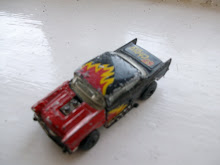As I've written before, football has changed to an incredible degree over the past decades. Players are paid more, top level grounds are of much better quality for players and spectators and just about every professional game in England is filmed for posterity. Often, the past is made to look overly romantic by people who weren't there, much like many aspects of life.
Journalist and broadcaster Gary Imlach's My Father and Other Working Class Football Heroes is a book I really should have read a long, long time ago. The central thread seems to be one of regret of a son not asking his dad more questions when they had the chance, and a mission to fill in the blanks of his own knowledge of the old boy's life, but there's also plenty on the realities of being a footballer in the post-war era.
Stewart Imlach was a genuine football star of the late 1950s, playing for Scotland at the 1958 World Cup and starring for Nottingham Forest when they won the 1959 FA Cup. A long way from his roots in a Scottish fishing village, the kind of place everyone leaves, not moves to. A star in youth football, he was picked up by Bury, quickly making a name as a quick left winger. Becoming a much watched player, he's soon on his way to Derby County, a move which doesn't work out, and he's passed onto Forest, where he plays his part in the their last shot of glory before the Clough years.
In that game, he was considered by most witnesses, including the legendary Stanley Matthews, to be the Man of the Match. He was a hero at the top of his game playing for a team with the potential to win further honours. However, football being as it was at the time, within a matter of years, he has dropped down two divisions through various managers' whims. At Coventry City, he is sold on by the man who did more for players' rights than just about anyone - Jimmy Hill. The author manages to interview the man, and is initially shocked when he can't remember the exact details of why he didn't want his dad - only to reflect that Hill would have dealt with hundreds of footballers over his long career.
Where the book succeeds best is showing the life the players had: Imlach Snr spent his summers doing various joinery jobs to bring in extra cash, he first finds out about his transfer by reading it in the local paper and there's the fact that Scottish players lost out financially from being in the squad that went to the World Cup. There's also vindictive managers and those that run the game treating players as little more than serfs due to the "Retain and Transfer" system that they were so reluctant to scrap, despite it turning out to be infringing on players' rights as workers.
Towards the end of the book, Gary Imlach works on trying to get his father awarded an actual "cap" from the Scottish FA: at the time, they were only given to players who played in a "Home" international against England, Wales or Northern Ireland. Even in the modern era, the authorities remain obstructive and inept. An English company makes him a replica instead, much to the old player's pride. That the Scottish FA should behave in such a way towards a man who represented his country with honour comes across as contemptible.
My Father and Other Working Class Football Heroes works excellently as a biography and a general football book - essential reading for fans of the game.
Subscribe to:
Post Comments (Atom)

No comments:
Post a Comment